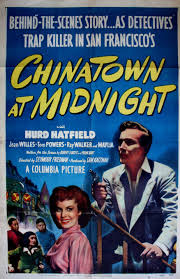
Clifford Ward (Hurd Hatfield) is a thief. He steals items for his girlfriend Lisa Marcel (Jacqueline deWit). Lisa is an interior decorator. She sells the stolen items to her clients. After delivering his last stolen item Lisa mentions to him that she is doing a home for a client. There is a Chinese white jade vase that would look perfect in the living room. She saw it at G.L. Wing’s. Clifford heads to the store she mentioned.
Clifford joins a tour bus in Chinatown. When they stop to get out to tour the area Clifford separates himself from the tour group and heads for Wing’s. The owner’s son, Joe (Benson Fong), is tending the store. When he tells Clifford that he can’t accept a check for such a large amount Clifford pulls a gun on him and tells him to wrap up the vase. Joe tries to hit the panic button but Clifford shoots him.
Joe’s fiancé, Betty Chang (Barbara Jean Wong), is in the back room. When she tries to phone the police he shoots her too. With the line still open the operator at the Chinese telephone exchange hears the shots. Clifford picks up the phone and says in Cantonese that the Wing store was robbed and to call the police. He puts the phone back on the hook and calmly walks out of the store with the wrapped up vase. He rejoins the tour group and calmly rides away on the tour bus.
Hazel Fong (Maylia) is the operator that Clifford spoke to on the phone. When both Joe Wing and his fiancé Betty Chang die Hazel is the only one left that heard his voice. Something she will need to know in the future. Captain Howard Brown (Tom Powers) has Sam Costa (Ray Walker) and Eddie Marsh (Ross Elliott) assigned to the case.
The police learn that a jade vase is missing from the store. They put a picture of it in the paper. Alice sees it and so does the woman she sold it to. Realizing the police will show up at any time Alice packs a bag and is ready to split when Clifford shows up. With the cops at the door and knowing that Alice will rat him out if she is caught, he shoots her. Clifford is now in a race to stay ahead of the police.
“Chinatown at Midnight” was released in 1949 and was directed by Seymour Friedman. It is a crime drama and a film noir. The film is basically a police procedural.
The movie is competently done and the acting was good. It was nice to see Asians portraying Asians. There were also some nice atmospheric shots of San Francisco. There were some plot points that seemed a little farfetched. The police use unmarked cars to stake out Clifford’s apartment but they send in a squad of them. Their quarry can’t help but notice all the black sedans with squawking radios outside his building. I was also surprised to see that machine guns were standard issue for the police when cornering a suspect.
There are other smaller things that would be forgivable if it wasn’t for the fact that there were so many of them. You’re a hunted criminal living in a dump picking up a chick at an aquarium. Why? If it wasn’t for the fact that the film is supposed to be noir it would be almost campy. Still it’s not horrible just not as noir as its label. The no nonsense narration is noir but the bumbling cop aspects not so much.
One clever ruse was the female cop pretending to be a census taker to get a look at Clifford in his dive hotel room. That was indeed clever. Trying to surround the room with twenty noisy cops, again, not so much.
The Chinatown Telephone Exchange is highlighted in the movie. It was established in 1894 and was at 743 Washington Street in San Francisco’s Chinatown. The operators were all female and were required to speak several dialects as well as English. The operators had to memorize at least a thousand subscriber names and numbers. Callers would ask for people by name or business. Many Chinese considered it rude to refer to people by number. Operators had to know people’s addresses and occupations in order to distinguish between two people that had the same name. At its height it had about three thousand subscribers.

